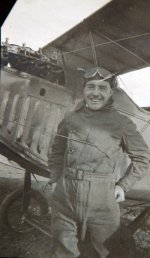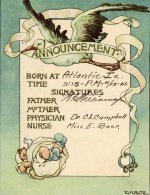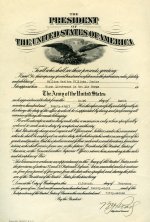
IV: The Joy of Flying
When you are very good doing what you like and have chosen to do, it ceases to be work. It may not quite qualify as play, but it is not mucking out the stables. Billy did not want to go back to work with Black Angus Cattle and porkers, and so he found a way to continue flying by becoming a barnstormer. His first job was risky. He illegally ferried nitroglycerin across the border to Mexicans who were trying to consolidate their revolution. They needed the stuff to sustain their power.
Flying nitro in a discarded old American inferior Jenny biplane was much more dangerous than lazing around the sky in 1984 in a modern bomber carrying a defused nuclear bomb. Billy and a buddy or two lowered the odds as best they could by rigging a spring-loaded box in the rear of the fuselage, hoping that the device would cushion the bumps and grinds of taking off and landing on property previously claimed by various furry beasties.
There was no doubt some ideology involved. Mildrede once said that Billy had a romantic streak in him, and did not like bankers and was disgusted by the poor performance of American aircraft companies. "He really liked the idea of helping other people make their own revolution even if he did not agree with it all." Let us not overestimate Billy as a closet revolutionary. He probably did it mostly because it was a challenge to him as a flyer and because it kept him flying.
The Mexicans did not have much money, but one way or another they provided the cash for the planes and the gas and some of the service. One has the feeling that Billy did most of the repair and upkeep. In any event, the Mexicans did pay with classic pottery that could be flown home in those safety boxes. Mildrede treasured that art for the rest of her life. It was romantic: nitro in and art out.
That operation became more than a bit dicey and Billy wandered back up the Mississippi, no doubt doing some country fair shows. Then his reputation (and old connections) back in Iowa earned him a job with an unusually innovative owner of a Ford Motor Car franchise based in Atlantic. The entrepreneur provided the plane and most of the service, and Billy's responsibility was to fly the capitalist around and about several states to check on his various local dealers. Despite the uncertainties of local "airports" and the vagaries of the weather, it was a good job. He was flying.
Given the unreliability, if not simply the inferior quality of the aircraft, they had a few accidents. Billy always took a solo check flight, and a couple of times the engine conked out shortly after takeoff. That was an accepted, even expected, risk, and he survived both episodes. Now and again they also nosed over while landing in a corn or wheat field. But it was easy to rock the plane back down on its tail skid, and Billy always carried a spare propeller and the necessary wrenches.
There is a bit of charming family folklore that Billy once flew Henry Ford out from Detroit to check on the profitability of his midwestern empire. There is no hard evidence for the tale. Maybe, just maybe, Billy gave Henry a ride around some Iowa town. But it seems more likely that it is one of those stories that emerge from the respect and affection that people had for Billy. He was very good, and a special human being, and many people believed that he could fly to the moon. Hence Henry Ford was rather incidental, a man just acknowledging the obvious. It is a touching - and surely revealing - fable.
Yet one does now and again wonder about it all. Billy was offered an extremely promising franchise for Ford Motor Cars in northern Iowa. There is no doubt about why he accepted the offer. Mildrede did not adapt well to being married to a barnstormer. The money came in periodic gulps rather than measured sips, and her husband's irregular schedule did not provide a foundation for the kind of secure life that she preferred. It was also difficult for her to teach on the side.
Billy changed his flying jacket for a business suit and became a car salesman in Coon Rapids, Iowa. Mildrede shortly went to work as a substitute teacher in third and fourth grades. But it did not jell. Billy was simply not a marketplace businessman. His heart was elsewhere. So after a year they moved back to Atlantic.
It was a satisfying change for Mildrede. Billy found it a troublesome, fretful, and frustrating shift even further away from what he knew he did best - flying. He handled it about as well as anyone could. It was too late to go back to the family farm, and in any event that would have involved again moving away from Atlantic where Mildrede had reestablished her old friendships and social routine.
Billy first went into partnership with Porter. He revived his old touch and skill with animals and shifted that magic to Tossie's hunting dogs. He also applied his knowledge of agriculture to Porter's abstract and title business. He also became involved in civic affairs: active membership in the Elks and Masons, a leader of the Boy Scouts, and finally Justice of the Peace.
He earned money, gained influence, and extended his already wide range of friendships. People did not simply like him. They knew they could trust him. They knew that he would listen to dark secrets, sympathize, forego judgment unless they asked for it, and under all circumstances keep his mouth shut.
He also played. He liked to party and had not lost his joy in dancing. He shifted his athletic skills from baseball to golf; partly to be with Porter but also to socialize with Mildrede's old crowd. He thought bridge a minor exercise (remember, they were playing auction), but he played it with an intuitive flair. He became intrigued by Mildrede's interest in birds: went out with her at four in the morning and learned to help her band them to track their migrations. But through it all, as one of his best friends observed, "any airplane that came over town had him looking at the sky the rest of the day."
Billy and Mildrede were undoubtedly committed to each other, surely sexually involved, but one nevertheless senses that they were living a bit at cross purposes. She easily slipped back into her old pattern of life in Atlantic. Mildrede was in her element. She sang, she served on library and other public committees, she substituted as a teacher, and she liked to socialize in the afternoons and evenings.
But as it had been in Coon Rapids, Billy was restless, unchallenged, and frustrated. Probably a bit bored. He could handle the dogs in a few hours. He hated office work. Perhaps he even began to worry that he was a failure. One brother was a banker, another was a dentist, another was a skilled brick maker, another had started a thriving business related to automobiles, and even George, the cripple, was helping out on the family farm. A modern career counselor might have advised Billy to go back to the farm and take the chance that Mildrede would accept that decision.
Then two things happened that changed everything. The first was that Mildrede became pregnant. Billy's best friend, the leader of the Jewish community in Atlantic, later said to Billy's son: "You have to realize that he wanted you very badly. He loved Milly very much and he wanted a child with her." And it went happily until the labor began. That scared everyone, including the doctor. Mildrede went to the hospital in spasms at noon and did not deliver until after nine in the evening. It was a wracking and wrenching experience.
Billy had said simply to Mildrede: "We will not put you through that again." It also seems reasonable to conclude that Billy understood that Mildrede did not want a multiplicity of children to compromise either her independence or her married life. They continued their passionate conjugal relationship, but Billy made sure that there were no more children.
In its own way, the second event was equally traumatic. Somehow, somewhere in the course of his flying experiences, Billy had made more than just a passing acquaintance with Charles Lindbergh, Jr. Hence when Lindy willed The Spirit of St. Louis off that muddy runway and then made it to Paris, Billy was ecstatic.
Mildrede was holding an ice cream social in the backyard that afternoon. The quiet young woman that had been babysitting the son almost since he came home from the hospital remembers it vividly. "I was out in the front yard playing with you and your father came roaring up the street and then up the front steps. He was yelling at the top of his voice: 'Milly! Milly! Milly! - he made it!!'"
Nothing was ever quite the same after that. Maybe that was because Lindbergh remembered Billy. After the hero returned from abroad, he undertook a tour of the United States in The Spirit of St. Louis. In the course of that ceremony, he sent a telegram to Billy asking him to meet in Omaha. Here we enter the eerie again. Billy accepted, but in his return wire he asked Lindbergh to fly over the home in Atlantic. It was only a couple of blocks off Lindy's basic visual flight pattern along old Highway No. 6 from Des Moines, Iowa, to Omaha. "My son will be out in the yard south of the highway. You can't miss him."
The son later became a historian who learned to read newspaper accounts of various events with some skepticism. The newspaper story says that Lindbergh missed Atlantic because he was too far south. Well, Lindbergh was a bit south of the highway. His return wire to Billy had estimated his time of arrival over the front yard at about 1300 hours. "I ought to see you in Omaha about 2 or 2:30."
So at approximately 1230 hours, Mildrede placed her son out in the front yard with a sandwich and a glass of milk. She had a special sense of things: it was a father and son matter, and she took her own chair out into the backyard. Lindy was a bit early. He came flying in visually along the old highway, eased down and banked a bit south, and waggled his wings as he flew exactly over the son. Mildrede waved, too.
Lindbergh may have done that elsewhere, even many times. There was an especial camaraderie back in those days. But it was a moment that nobody in that family forgot, and it surely determined Billy to go back to flying. Within the year he accepted an invitation from the Army Air Corps to return to active duty on the flight line.
Somewhat to everyone's surprise, Mildrede was delighted. She threw away some old clothes and bought new underwear. Her mother Maude remembered that "she was packed a week before you were supposed to leave." They climbed into a two-year-old Hudson with wooden spokes and started off down through Nebraska and Kansas to see old friends in Oklahoma. They had kind of forgotten the easy roads to Fort Sill and on the way got wandering around on unpaved trails.
Already in a fix, they encountered a ferocious thunderstorm and became mired in Oklahoma gumbo. Billy put the car in neutral, and they all got out to push the beast onto solid ground. They were soaked within a minute. They could rock a bit, but they could not get it to roll. Maybe that was fortunate because no telling where it might have gone. Finally a farmer came rumbling up in a Ford tractor. He was sitting under a huge umbrella.
"You folks must not be from around these parts. We don't go out in this kind of weather except in our old Suzies here."
Billy could handle that kind of situation.
"You're right. I'm from Iowa and I forgot to bring the horses. So if you can tell us what to do I'll be much obliged."
The farmer laughed. The son will remember that laugh all his life. "Well...." Then another laugh. "Well...."
"It's nice to meet an honest man even if he is kind of dumb."
Billy laughed. They shook hands.
"Well, you hitch this line to your axle and we'll see what old Suzie can do."
So they got pulled out of the gumbo and made their way to Texas. Mildrede was initially not too excited about living in officer's quarters that were in truth nothing more than World War I barracks for enlisted men reconditioned as apartments. She had forgotten about the hot wind and the red fire ants that were not friendly. And there were not many trees, and no country club. Some of the women were scared that Mildrede's husband would displace their men (and they were correct). But she took a deep breath, asserted her genuine concern for social and educational problems on the base, and soon began to make friends. And she was truly happy that her man was back in his element.
She truly loved the excitement. The son remembers many happy moments, but one is deeply embedded in his life. Once, after an early supper, they shooed him out to play. Then, suddenly, just about sunset, they came rushing down the stairway and grabbed him out of a game of marbles and dumped him in the back seat and blew dust as they accelerated toward the base.
Billy and Mildrede sat very close in the front seat. They did not say a word until they came up on a knoll which made it look like the world was on fire.
"Oh my God, Billy, the base is on fire and you are late!"
There was terror in her voice.
Then they topped the rise and realized that it was just the sunset. Billy slowed the car to a stop, and they hugged each other.
For the son, even then it was a beautiful moment. Some years later he understood that they were late because they had been making love with each other.
They were flying with each other, and it was joyful.
Table of Contents
- Introduction: The Name of the Lady
- II. The Voyage to An Identity
- III: Married by Choice and With Passion
- IV: The Joy of Flying
- V: Death, Depression and Recovery
- VI: Another Kind of Depression
- VII: Building Another Life
- VIII: Fulfillment - And Its Costs
- IX: Departure With Dignity




